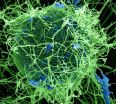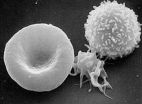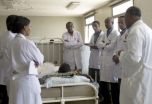(Press-News.org) Researchers have discovered that women who had been prescribed aspirin regularly before being diagnosed with breast cancer are less likely to have cancer that spread to the lymph-nodes than women who were not on prescription aspirin. These women are also less likely to die from their breast cancer.
The study of Irish patients funded by the Irish Health Research Board and Irish Cancer Society and published by the American Association for Cancer Research in the Journal, Cancer Research, analyses records from the National Cancer Registry Ireland (NCRI), and prescription data from the General Medical Service (GMS) pharmacy claims database.
"Our findings suggest that aspirin could play a role in reducing mortality from breast cancer by preventing the cancer spreading to nearby lymph nodes", said Dr Ian Barron, the lead author who carried out the research at Trinity College Dublin, and is now working at Johns Hopkins, USA.
"We analysed data from 2,796 women with stage I-III breast cancer. We found that those women prescribed aspirin in the years immediately prior to their breast cancer diagnosis were statistically significantly less likely to present with a lymph node-positive* breast cancer than non-users. The association was strongest among women prescribed aspirin regularly and women prescribed higher aspirin doses. We now need to establish how and why this is the case".
The findings are consistent with two other major studies. The first is an analysis of cardiovascular trials where pre-diagnostic aspirin** use was associated with a statistically significant reduction in the risk of developing metastases and dying from cancer.
The second is an observation from in vivo breast cancer models, which suggest a possible mechanism by which aspirin may reduce the risk of cancer spreading to other parts of the body.
Professor Kathleen Bennett, a co-author from the Department of Pharmacology & Therapeutics, School of Medicine, Trinity College Dublin said: "Our study was observational and these results do not mean that women should start taking aspirin as a precautionary measure. Aspirin can have serious side effects. We still need to identify exactly how aspirin may prevent breast cancer from spreading to the lymph nodes; which women, or types of breast cancer, are most likely to benefit from taking aspirin; as well as what the optimum doses might be. Research to help answer the next questions is funded by the Irish Cancer Society as part of its first National Collaborative Cancer Research Centre, BREAST-PREDICT".
Dr Graham Love, Chief Executive of the Irish Health Research Board said:
"These results have great potential to help improve our understanding of how to increase Irish and global survival rates from breast cancer."
INFORMATION:
More details on the research paper are available at the link below.
http://cancerres.aacrjournals.org/content/74/15/4065.full?sid=e5351c14-2cff-4bf8-ac16-1c69e6ebdcec
cancerres.aacrjournals.org
Notes to Editors
* lymph node positive breast cancer is one in which the cancerous cells have also been detected in the lymph nodes closest to the breast. It usually indicates a more serious cancer.
**Asprin is commonly used as a blood thinner in patients at risk of cardiovascular disease.
You can find out more about the BREAST–PREDICT project at http://www.breastpredict.com
The Health Research Board (HRB) is the lead Irish agency responsible for funding health research.
We currently have €100 million invested in people doing research in universities and throughout the health services and in developing the environment and infrastructure to do health research better. The ultimate aim is improve people's health, patient care and health service delivery.
About Trinity College Dublin
Trinity College Dublin, Ireland's oldest university is recognised internationally as Ireland's premier university and continues to be at the cutting edge of research, technology and innovation, placing the university at the forefront of higher education in Ireland and internationally. It encompasses all major academic disciplines, and is committed to world-class research activities in key areas across science, engineering, social sciences, medicine and the arts.
The Irish Cancer Society's Research Programme
The Irish Cancer Society is Ireland's national cancer care charity that is committed to driving the agenda for cancer research in Ireland through their substantial commitment and investment in cancer research. In 2012, the society invested more than €2.5 million in cancer research, making them the largest voluntary funder of cancer research in Ireland. This funding is in addition to the €30 million the society has contributed to cancer research since 1963. For further information on the Irish Cancer Society's Research Programme or to make a donation, visit http://www.cancer.ie or contact the Irish Cancer Society helpline on 1800 200 700.
New Irish research sheds light on how aspirin works to reduce cancer deaths
2014-08-14
ELSE PRESS RELEASES FROM THIS DATE:
New non-invasive technique controls size of molecules penetrating the blood-brain barrier
2014-08-14
New York, NY—August 14, 2014—A new technique developed by Elisa Konofagou, associate professor of biomedical engineering and radiology at Columbia Engineering, has demonstrated for the first time that the size of molecules penetrating the blood-brain barrier (BBB) can be controlled using acoustic pressure—the pressure of an ultrasound beam—to let specific molecules through. The study was published in the July issue of the Journal of Cerebral Blood Flow & Metabolism.
"This is an important breakthrough in getting drugs delivered to specific parts of the brain precisely, ...
Workaholism: The addiction of this century
2014-08-14
In spite of the many positive aspects of work, some people are unable to detach from it – working excessively and compulsively. These are called workaholics.
Postdoctoral Fellow Cecilie Schou Andreassen and colleagues from the Department of Psychosocial Science at the University of Bergen (UiB) in Norway has been the first to assess workaholism in a nationally representative sample.
According to Schou Andreassen, the "workaholism" concept has been studied by scholars for nearly 45 years. Still, reliable statistics on the prevalence of workaholism is hard to find. The ...
EARTH Magazine: La Brea climate adaptation as different as cats and dogs
2014-08-14
Alexandria, Va. — The La Brea tar pits in downtown Los Angeles are a famous predator trap. For every herbivore, a dozen or more carnivores — saber-toothed cats and dire wolves chief among them — are pulled from the prolific Pleistocene fossil site. In fact, the remains of more than 4,000 dire wolves have been excavated, along with more than 2,000 saber-toothed cats. The sheer number of fossils allows researchers to ask population-level questions about the climate and environment as well as how these animals evolved.
Now, two new studies focusing dire wolves and saber-toothed ...
Ebola outbreak highlights global disparities in health-care resources
2014-08-14
The outbreak of Ebola virus disease that has claimed more than 1,000 lives in West Africa this year poses a serious, ongoing threat to that region: the spread to capital cities and Nigeria—Africa's most populous nation—presents new challenges for healthcare professionals. The situation has garnered significant attention and fear around the world, but proven public health measures and sharpened clinical vigilance will contain the epidemic and thwart a global spread, according to a new commentary by Anthony S. Fauci, M.D., director of the National Institute of Allergy and ...
New blood: Tracing the beginnings of hematopoietic stem cells
2014-08-14
Hematopoietic stem cells (HSCs) give rise to all other blood cell types, but their development and how their fate is determined has long remained a mystery. In a paper published online this week in Nature, researchers at the University of California, San Diego School of Medicine elaborate upon a crucial signaling pathway and the role of key proteins, which may help clear the way to generate HSCs from human pluripotent precursors, similar to advances with other kinds of tissue stem cells.
Principal investigator David Traver, PhD, professor in the Department of Cellular ...
Novel chip-based platform could simplify measurements of single molecules
2014-08-14
Researchers at UC Santa Cruz have developed a new approach for studying single molecules and nanoparticles by combining electrical and optical measurements on an integrated chip-based platform. In a paper published July 9 in Nano Letters, the researchers reported using the device to distinguish viruses from similarly-sized nanoparticles with 100 percent fidelity.
Combining electrical and optical measurements on a single chip provides more information than either technique alone, said corresponding author Holger Schmidt, the Kapany Professor of Optoelectronics in the Baskin ...
Stem cells in the skeletal muscle promote the regeneration of severe nerve peripheral injury
2014-08-14
A research group at the muscle physiology and cell biology unit, the Tokai University School of Medicine, Japan, led by Dr. Tetsuro Tamaki, have developed the stem cell isolation method from the skeletal muscle, termed skeletal muscle-derived multipotent stem cells (Sk-MSCs), which can differentiate into Schwann and perineurial/endoneurial cells, and vascular relating pericytes, endothelial and smooth muscle cells in the damaged peripheral nerve niche. Application of the Sk-MSCs in the bridging conduit of the long nerve gap injury resulted favorable axonal regeneration ...
Up-regulation of neuronal alpha-1 adrenoceptors after peripheral nerve injury
2014-08-14
In a Perspectives paper published in Neural Regeneration Research (Vol. 9, No. 14), Professor Peter Drummond speculates about neuronal changes that might contribute to chronic pain after peripheral nerve injury. Professor Drummond and co-workers at Murdoch University, Perth Western Australia, discovered recently that the expression of α1-adrenoceptors increases on pain-signalling nerve fibers that survive peripheral injury. As these receptors boost neural excitability, an increase in their expression could intensify pain. After tissue injury, resident cells and other ...
New frontiers of fecal microbiota transplantation
2014-08-14
Bethesda, MD (Aug. 14, 2014) – Fecal microbiota transplantation (FMT) is one of the most innovative new treatments of the 21st century. Experts believe that this procedure, which transplants microbes from one human gut to another through fecal matter, could offer the cure to a vast range of diseases and shed new light on the role of the microbiome in gastrointestinal diseases. New research presented this weekend at the American Gastroenterological Association's 2014 James W. Freston Conference in Chicago, IL, highlights significant advances in this field, and confirms the ...
Scientists detail urgent research agenda to address chronic disease toll
2014-08-14
Health care systems that keep HIV patients from dying early in low- and middle-income nations need urgently to be repurposed to treat the chronic diseases that many of these patients now have, experts say.
According to recommendations resulting from a multidisciplinary conference sponsored by the National Institutes of Health, scientists and physicians in low- and middle-income countries should build on existing HIV research to study and treat chronic conditions. Patients once condemned to death by AIDS now suffer from noncommunicable diseases such as tuberculosis, cancer, ...



